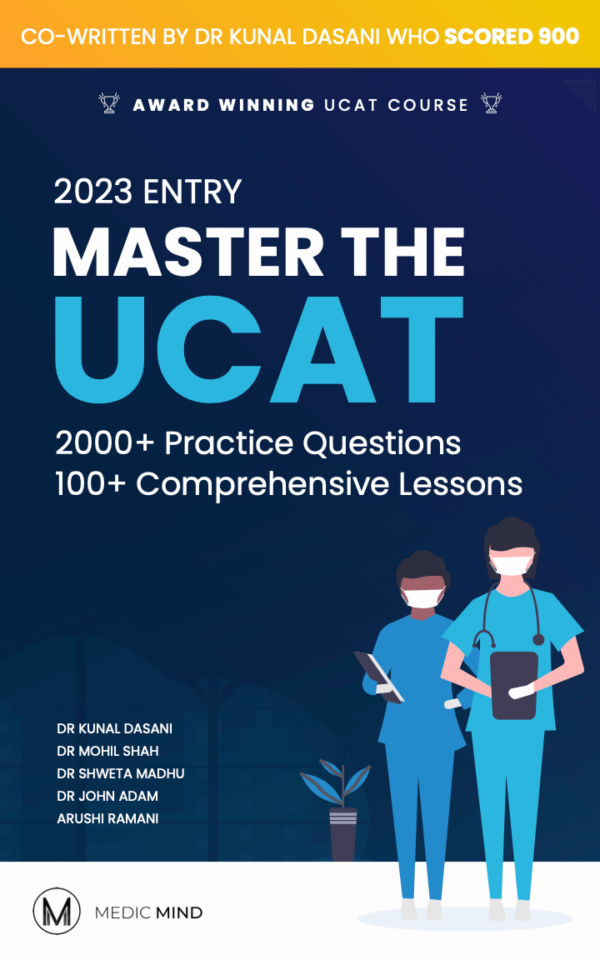Loading...

UCAT Situational Judgement: 10 Tips For UCAT Success
The Situational Judgement is the final section of the UCAT. It looks at how you would react in certain clinical or professional settings. Despite being the last section, and arguably the least time pressured, do not think that it is any less important. You need to make sure that you do not neglect it so you ensure you are a Band 3 or above as this is a common cut-off for lots of UCAT universities. These ten tips will help you to succeed with your preparation.
1. Make sure you look at the GMC guidance
Many students tend to learn UCAT Situational Judgement by trial and error. Doing mock questions is great practice however, as with every part of the UCAT, it is best to learn the theory first. This will then give you a great foundation for practising this section.
The GMC is the General Medical Council in the UK. Amongst other things, they set the professional standards expected of medical students and doctors in the UK. The UCAT was designed to be used for admission to NHS UK medical schools so a lot of the answers for the Situational Judgement section are based around the GMC’s published guidance.
The first thing to do is to read through and got your head around the GMC guidelines. The document is quite long so it may help if you make your own document to summarise them in. This will mean you always have something to refer back to while you are practising. Over time, try to refer less and less to the document when you answer.
The GMC have also published guidance for medical students. This covers the same principles as the original document but is more tailored to situations you may encounter during medical school. A lot of the scenarios given to you will be like this so it’s a good addition to your revision.

2. Understand the options
The difference between the SJT options in the UCAT can be incredibly minute and consequently, very confusing! In order to choose the right answer, you need to understand what the options mean. Here’s a guide to one of the most common question types:
- A very appropriate thing to do means it addresses the main problem in the stem without negative consequences
- Appropriate, but not ideal, means that whilst it solves one of the issues in the stem, it isn’t the most ideal solution
- Inappropriate, but not awful, means that it has transient negative consequences
- A very inappropriate thing to do means it either doesn’t address the problem at all or actively makes the issue worse

3. Use the ‘Rule of 3’ when reading the question
The ‘rule of 3’ comprises the 3 primary things you need to make a mental note of before attempting the question. These are:
- Role: What is your role in this scenario? How a doctor reacts to a situation will be very different to how a medical student may be expected to act. Therefore, note down your role and react accordingly.
- Setting: How one responds to a scenario depends on the setting of the problem. For example, it is always best to have personal conversations with a colleague in private and so, doing this in public would be inappropriate.
- Main problem: Most scenarios will have more than one issue that needs solving; find the main one and focus on solving it in the most appropriate manner.
4. Always keep the patient at the forefront of your decision-making
Patient safety is a key factor in decision making in Medicine. This included their health and physical safety, but also safety of their information (i.e. confidentiality). Therefore, options that do not respect these are often inappropriate. Similarly, scenarios where patient safety is at stake, amongst other problems, should prompt recognition that this is the primary issue. It can be helpful to use the 4 pillars of medical ethics when considering what is best for patients:
- Beneficence – “do good”, consider if your actions benefit the patient
- Non-Maleficence – “do no harm”, consider if your actions are causing the patient harm and how to avoid this
- Autonomy – allowing the patient to make their own decisions and respecting them
- Justice – treat all patients equally and in consideration of the law
5. Don’t neglect the Situational Judgement section
As aforementioned, being the last section some students neglect this section.
It is important to note that some universities look at Situational Judgement more than others. For some universities, your application will not be considered if you have a poor score but apart from this the section is not considered. Other universities will put a greater emphasis on Situational Judgement by using it as part of the MMI interview process. Make sure to research your chosen universities and find out just how much it is taken into account.
Regardless of how much your chosen Universities consider the SJT section, it is critical that you do not neglect studying for it. As scoring highly in this section will keep as many options as possible open to you when applying.
Additionally, your SJT score is the only score that you cannot hide behind your UCAT average as it is stated as a separate “banding score” alongside your UCAT total or average numerical score.
This section has a different scoring system to the other sections, so it’s useful to familiarise yourself with this too.
| Band 1 | Performed at an excellent level, displaying judgement similar to the majority of the expert panel. |
| Band 2 | Displayed a decent level of performance, often demonstrating appropriate judgement, with several responses corresponding to model answers. |
| Band 3 | Performed at a modest level, displaying appropriate judgement for some questions and significant differences from model responses for other questions. |
| Band 4 | Performed poorly, displaying significantly different judgement than the model response in several cases. |
6. Search for resources carefully
Situational Judgement tests are used throughout medical careers for doctors at all stages of training. For example, situational judgement tests are used at university, during Foundation Years and even when you specialise. Therefore, make sure to search for ‘Situational Judgement UCAT’ if you’re looking for the best questions. There is so much out there, you what to make sure the ones you are doing are appropriate, as you don’t want to end up doing a Cardiology Speciality test!
Additionally, various resources will argue their own rationales for the problems in the SJT. Therefore, it’s important to rely on formal sources and experts to guide you. Medic Mind’s 1-1 tutoring for the SJT can come in handy as our tutors have had first-hand experience with the SJT at multiple levels in their career – check us out here!
7. Analyze the rationale properly
When practicing, it is important to understand the reason behind the right answers. This is the case even if you got it right. If a book or question bank doesn’t give good explanations for the questions, then it may be an inadequate resource to prepare you. If this is the case, try and reference back to the GMC guidance and see where your particular scenario would fit in.
As you do more scenarios, you’ll find that certain themes and rules pop up more than others. Use these as a guide to answer questions! For example, when solving inter-professional issues, always solve them locally (i.e.; with the person in question) before escalating unless there is an acute threat to someone’s safety.
If you continue to struggle with explanations, then you may benefit from some one-to-one tuition. All of our tutors have experience within the NHS and are well versed with GMC guidelines, so can give expert advice.
8. Prepare for the full length of the test
Many students’ intellectual energy fade during the Situational Judgement section. They have prepared hard for the other sections and have expended all their energy answering all of the previous questions. This impacts their score in the final section as they run out of steam right at the end. Remember that your score for this section is reported separately – there’s no point getting 900 (the maximum score) in all other sections if you have no energy left for situational judgement and get a Band 4!

You need to make sure that this does not happen to you on test day. Make sure you practice mock exams that are the full length of the UCAT, so you will learn the stamina needed to get you all the way through on test day. Remember if you get extra time in the test be sure to add this on to your practise.
Boost your UCAT Score with our Expert Tutors!
9. Timing tips
This section is the least time pressured section. You have the luxury of having time to fully read each question carefully to make sure you don’t miss any key details. In the Situational Judgement section you have 26 minutes to answer 69 questions, so ensure you use this time well. Make sure not to rush but think carefully about your answers. Equally, do not become complacent – the test is not finished yet.

Once again this reiterates why it is so important not to neglect this section of the test. Practising and preparing for it will allow you to find a rhythm when answering the questions. And by knowing roughly how long it takes you to answer a question, you will know on test day if you answering too slowly or too quickly.
10. Do not be too indecisive
Sometimes students deliberate too much in Situational Judgement and go back and forth between answer options. You will get a half mark just for getting the right side (a/b or c/d). This does not mean that you should rush, but try not to spend too long deciding between a or b for example.
Practice is something that will help significantly if this is something that you struggle with. It will allow you to get used to the question types and understand the ethics behind the questions. Once you are familiar with both of these things you will be able to move through the questions confidently and efficiently.
Finally, as with all things related to medical school applications, remember to keep your cool and separate your self-worth from your score. Ultimately, getting into medical school is an incredibly holistic game and one poor score will not dictate the entirety of your chances.
Good luck!
Frequently Asked Question
→What is UCAT SJT?
→How is UCAT SJT scored?
You are given an overall band depending on your raw score. The bands range from Band 1 (the highest) and Band 4 (the lowest). In 2022 20% of candidates scored a Band 1, while 14% received a Band 4. Take a look at our UCAT scoring guide here for more info.
→Can I prepare for the UCAT Situational Judgement section without prior knowledge of ethics?
Yes, it is possible to prepare for the UCAT Situational Judgement section without prior knowledge of ethics. However, it may be helpful to familiarize yourself with basic ethical principles and considerations before practicing with sample questions and scenarios.
→Can I skip questions on the UCAT SJT?
No, it is not possible to skip questions on the UCAT Situational Judgement section. You must answer all questions within the allotted time.
→Can I retake the UCAT SJT?
No, it is not possible to retake individual sections of the UCAT. You must retake the entire test if you wish to improve your score.
→Is Situational Judgement Test important in UCAT?
Yes, the Situational Judgement Test (SJT) is an important section of the UCAT (University Clinical Aptitude Test) and is used by many UK medical and dental schools as part of their admissions process. The SJT is designed to test a candidate’s ability to understand and respond appropriately to real-life scenarios and ethical dilemmas that they may encounter in their future healthcare career. The SJT section assesses a candidate’s judgement and decision-making abilities, which are important qualities for healthcare professionals. Therefore, it is important to prepare for and perform well on the UCAT Situational Judgement Test.
Related
Related Articles
Support for the whole medical application process from UCAS application, UCAT/BMAT, personal statement, interview and more!
With over 1000 UCAT questions, mock paper walkthroughs and timing tips and advice
A unique opportunity to explore the world of healthcare through interactive simulations and real-life case studies. Run by senior physicians
Personalised private lessons, tailored to your UCAT needs





Was this article helpful?
Still got a question? Leave a comment
Leave a comment